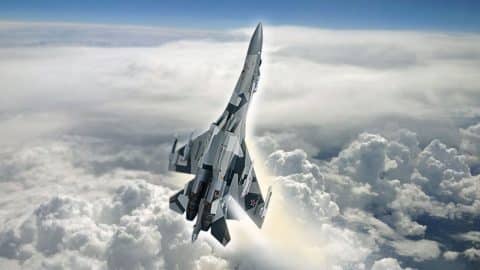
YouTube / The Buzz
If you’ve ever been to an air show, then you’ve probably seen some impeccable aerobatic maneuvers. After all, these demonstrations are one of the best ways we can see these warbirds reach their full potential. Here are the best 8 jet maneuvers that will surely make your jaw drop:
This consists of three-quarters of a normal loop, a half roll, three-quarters of another normal loop, and another half roll followed by recovery from the dive to straight level flight.

This type of maneuver has said to have been invented by Len Povey, an American pilot who served with the Cuban Air Force. He executed this maneuver by accident in 1936 at the All-American Air Race Meeting in Miami.
“Basically a Pugachev’s Cobra taking its sweet time.” The pilot follows the same procedure in a Cobra, but instead of pitching forward to recover right away, he merely sits there for a few moments.

Fighter jets with high thrust-to-weight ratios can let it hover at a near-vertical angle for a long period of time. It stays there until it “falls forward” into a steep dive to transition back to aerodynamic flight.
Flat spins are one of the most dangerous types of spins. In this maneuver, the aircraft has no forward airspeed. It sinks straight to the earth while spinning around its vertical axis.

The plane draws a bell’s pendulum motion in the sky by going nose-up at zero speed and then falling backward down. This variation allows the aircraft to propel forward almost vertically while also braking and following the movement of its tail.

Anatoly Kvochur was the first to fly the bell tailslide in a MiG-29 at the Farnborough Airshow in 1988.
Also called a rudder stall or oscillation stall, this maneuver makes the aircraft perform a stall that causes it to spin. These controlled stalls are usually performed by fixed-wing aircraft, purposely stalling the plane and then carefully using the rudder to try and hold the aircraft on a steady course.

As the speed drops, the pilot holds it level in both directions. When the stall speed is reached, the plane then loses lift and begins to fall.
Known by others as the J-Turn, the Herbst maneuver was first performed on April 29, 1993, by an X-31.

The maneuver requires the pilot to roll the plane a little while its nose is pointed at the sky so that when the nose comes down, the plane is oriented in a different direction.
The Cobra maneuver is a fast vertical pitchup from level flight without commencing a climb, followed by a forward-pitch back to level flight.

If done correctly, the plane should maintain an almost straight flight and does not roll or yaw in either direction.
Fighter jets such as the Saab 35 Draken MiG-21, Su-27, Su-57, and the MiG-29 have all done this maneuver in the past.
Also known as the Frolov Chakra, this demonstration was developed by Russian pilots by performing an extremely tight loop – often not much wider than the aircraft’s length.

It is similar to the Cobra, but the Kulbit completes the loop that the Cobra breaks off nearly immediately.